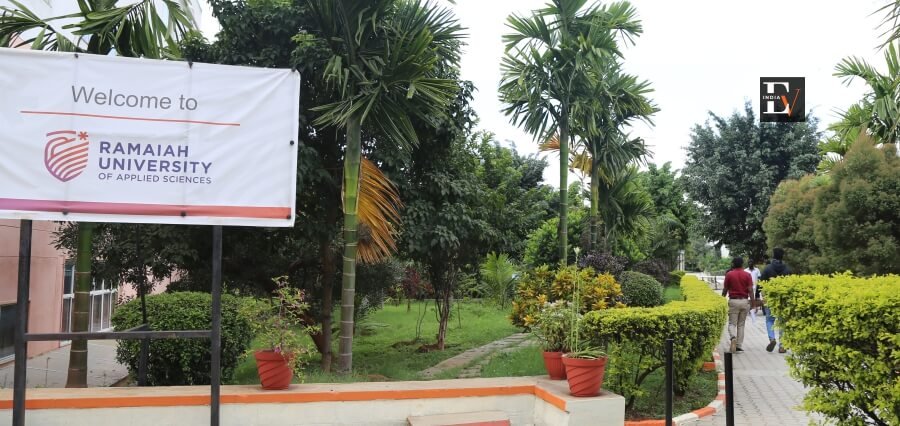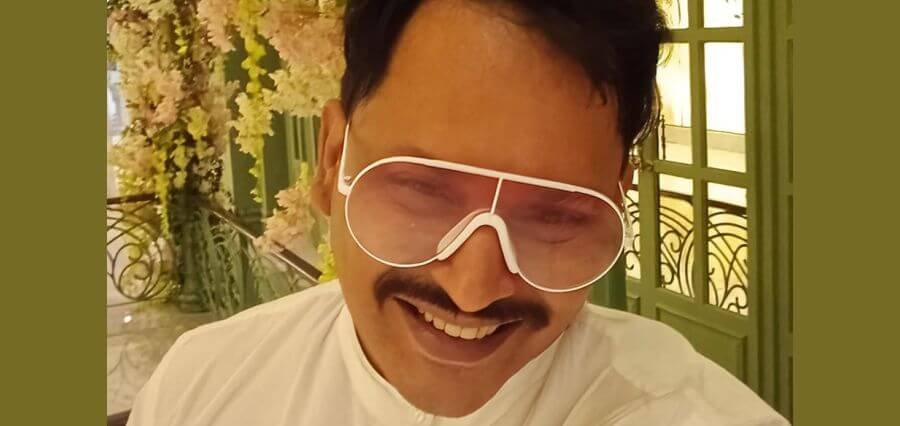A place where creativity meets technology, and ideas transform into reality—this is the essence of life at M.S. Ramaiah University of Applied Sciences (MSRUAS). Here, students don’t just learn; they innovate, experiment, and bring their visions to life.
At MSRUAS, education is more than textbooks and lectures—it’s an integrated journey of academics, research, hands-on training, real-world problem-solving, and entrepreneurship. The university offers undergraduate, postgraduate, and doctoral programs across diverse disciplines, from Medical Sciences and Engineering to Art & Design, Management, and Life Sciences.
With an unwavering commitment to technological advancements, the curriculum incorporates Artificial Intelligence, digital prototyping, virtual fashion, and 3D design, ensuring students stay ahead of industry trends. Fashion design students, for instance, build their portfolios and showcase their creations at Miraki, the university’s annual fashion show—where their dream designs take center stage.
Every corner of MSRUAS is alive with innovation—whether it’s a budding entrepreneur launching a startup, an engineer developing a cutting-edge prototype, or a designer creating the next big trend. Here, students don’t just prepare for the future; they shape it.
A Hub of Innovation, Creativity, and Excellence
Over the years, M.S. Ramaiah University of Applied Sciences (RUAS) has emerged as a leading state private university approved by UGC, dedicated to student-centric higher education. The university integrates academics, research, hands-on training, real-world problem-solving, and entrepreneurship, preparing students to navigate and shape the future of their industries.
RUAS offers a diverse range of 127 programs across 13 faculties, including Medical Sciences, Engineering and Technology, Art and Design, Management and Commerce, Hospitality and Catering Technology, Pharmacy, Dental Sciences, Mathematical and Physical Sciences, and Life and Allied Health Sciences. The university’s evolution has brought together several well-established institutions of the Ramaiah Group, reorienting them to meet contemporary challenges and future opportunities. Through a unique blend of academia, industry, and societal engagement, RUAS continues to mold the thinkers, creators, and leaders of tomorrow.
The Faculty of Art and Design (FAD) was established in 2014 and has since been offering undergraduate and postgraduate programs in design. The Department of Fashion Design, introduced in 2017, aligns its vision and mission with the university’s broader goal—to be a premier institution of academic excellence in global fashion, textiles, research, and industry partnerships. The department fosters creativity, innovation, and ethical practices, pushing the boundaries of design while embracing sustainability and global industry trends.
Recognizing the apparel industry’s significant contribution to economic growth, RUAS encourages students to explore cutting-edge fashion technology and design. Sustainability is embedded at every stage, from raw material sourcing to final production, ensuring an environmentally conscious approach to fashion. Industry collaboration is a core part of the curriculum, providing students with real-world exposure through internships and projects. Additionally, from the second year onward, students receive training in innovation and entrepreneurship, nurturing their ability to launch fashion startups and develop business acumen.
With its commitment to academic excellence, industry relevance, and sustainable innovation, M.S. Ramaiah University of Applied Sciences continues to empower students to redefine the future of fashion and design on a global scale.
Blending Innovation, Technology, and Creativity
The world of fashion design is constantly evolving, presenting both exciting opportunities and challenges in textile production, apparel innovation, and intelligent fashion. With the advent of Fashion 4.0, the industry is witnessing groundbreaking advancements in textiles, digital design, and smart apparel. Staying ahead requires continuous adaptation to new technologies, innovative materials, advanced machinery, and digital processes—a vision that the Fashion Design Department at M.S. Ramaiah University of Applied Sciences (RUAS) is committed to achieving.
At RUAS, fashion education goes beyond creativity; it embraces technological transformation. The digitization of design and visualization, integration of artificial intelligence in fashion, and 3D virtual prototyping are embedded into the curriculum, ensuring that students are equipped with cutting-edge skills. Research and innovation in functionality-driven apparel design further enhance their ability to create market-ready yet original designs.
In alignment with the National Education Policy (NEP) 2020, the department has developed an industry-oriented curriculum, shaped through insights from academic experts, industry professionals, and alumni feedback. Its effectiveness is continuously measured by tracking emerging trends and evaluating industry needs. Students are encouraged to engage in interdisciplinary projects, collaborate with global experts, and participate in exhibitions and conferences to expand their professional network and industry exposure.
The Fashion Design Department places a strong emphasis on talent acquisition, professional development, and diversity, ensuring that both faculty and students stay ahead of industry trends. Industry collaboration is actively fostered through workshops, guest lectures, and hands-on training with textile and apparel professionals. Faculty members are also provided with ongoing exposure to industry advancements, ensuring their expertise remains current.
Further strengthening its commitment to excellence, the department is focused on expanding partnerships with leading fashion, textile, and research organizations. Collaborative initiatives such as conferences, exhibitions, hackathons, student projects, internships, and industry placements offer students a platform to showcase their creativity, develop entrepreneurial skills, and gain real-world experience.
By blending innovation, technology, and creativity, RUAS’s Fashion Design Department is shaping the next generation of dynamic, industry-ready fashion professionals, prepared to lead in an ever-evolving global fashion landscape.
Innovative Learning and Industry Exposure
At M.S. Ramaiah University of Applied Sciences (RUAS), the Fashion Design Department is committed to fostering creativity, practical expertise, and a deep industry understanding through innovative teaching and learning strategies. The curriculum integrates hands-on projects, portfolio development, conceptual sketches, and skill-based training, ensuring that students not only enhance their creativity but also build technical proficiency and industry awareness. A flexible hybrid teaching model—incorporating class discussions, design critiques, and interactive sessions—further cultivates a sense of ownership and enthusiasm in learning.
A highlight of the program is “Miraki Fashion Show,” an annual portfolio presentation where students showcase their original designs and are evaluated on aesthetic appeal, innovation, choreography, theme execution, presentation skills, and future vision. Additionally, the department organizes international hackathons, design exhibitions, and competitions, encouraging students to explore cutting-edge themes and incorporate heritage and cultural diversity into their creations.
To ensure students remain at the forefront of industry trends, the program provides extensive industrial exposure. Through field studies, internships, and industry collaborations, students gain first-hand experience with new technologies, materials, product innovations, advanced machinery, and sustainable fashion practices. The program also emphasizes design fundamentals, enabling students to develop fashion products that align with public health, safety, cultural, societal, and environmental considerations.
Interdisciplinary collaboration is a key focus, allowing students to work with peers across various disciplines on projects, research, and design innovations. With access to experienced faculty, state-of-the-art laboratories, and cutting-edge software, students are empowered to push creative boundaries and develop industry-relevant skills, preparing them for dynamic careers in the global fashion industry.
Shaping Future-Ready Designers
The Fashion Design Program at M.S. Ramaiah University of Applied Sciences (RUAS) offers an application-based education, equipping students with professional knowledge and practical skills while emphasizing creativity, innovation, and sustainability. With a curriculum that integrates environmental studies, sustainable fashion, and fashion ethics, students engage in real-world projects related to textile waste management and circular fashion, ensuring they develop a strong sense of social and environmental responsibility.
Throughout their academic journey, students receive guidance and mentorship in developing designs, assignments, case studies, and projects that incorporate ethical fashion principles and sustainability-focused community service initiatives. The program ensures that learners constantly observe, analyze, and adapt their designs to meet evolving technical, functional, and social needs, preparing them for the challenges of the future fashion landscape.
Fusion of Creativity, Innovation, and Industry Excellence
The Fashion Design Program at M.S. Ramaiah University of Applied Sciences (RUAS) offers an application-based education, equipping students with professional knowledge and hands-on skills while fostering creativity, technical expertise, and sustainability-driven design thinking. The program ensures that students constantly observe, analyze, and refine their designs for feasibility, functionality, and adaptability to societal and environmental needs, preparing them for the evolving fashion landscape of the future.
With a strong emphasis on practical learning, students gain exposure to new innovations, product launches, material advancements, and industry trends through live demonstrations, research projects, and industry collaborations. The department actively encourages interdisciplinary projects, providing students and faculty with national and international networking opportunities with industry leaders and academic professionals. Students also have access to recognized industry certifications, enhancing their career prospects and preparing them to become dynamic professionals in the global fashion industry.
Industry Collaboration and Expert Engagement
The Fashion Design Department prioritizes strong industry partnerships by collaborating with leading apparel and textile industries. Industry experts are regularly invited for workshops, guest lectures, and hands-on training sessions, ensuring that students stay updated with current industry demands and future trends. Faculty members also receive continuous exposure to the latest developments in fashion and textile technology, enabling them to deliver cutting-edge education. Additionally, students and staff are encouraged to participate in industry exhibitions and conferences, allowing them to showcase their work and build professional networks.
Admissions and Eligibility
Candidates seeking admission to the Bachelor’s in Fashion Design program must have completed Pre-University level education (or equivalent) from a recognized State/Central Board or a three-year Diploma from a State Board. Diploma holders in Fashion Design, Apparel Design and Fabrication Technology (ADFT), Handloom Technology, Textile Technology, or allied disciplines are eligible for lateral entry into the program. Students pursuing fashion design typically have a passion for creativity, sketching, painting, embroidery, surface design, and innovative fashion techniques—making this program an ideal platform to refine and showcase their hidden talents.
State-of-the-Art Facilities and Laboratories
The Fashion Design Department is equipped with cutting-edge laboratory facilities, ensuring a comprehensive learning experience.
- Pattern Making and Garment Construction Lab – Equipped with 54 advanced fashion makers, power and domestic single needle lockstitch machines, mannequins, and other essential fashion design tools.
- Computer-Aided Design (CAD) Laboratory – Features 20 high-performance computers with specialized software including Reach CAD, Photoshop, AutoCAD, and CorelDRAW for digital fashion design and visualization.
- Textile Fibres, Dyeing, and Quality Testing Lab – Houses industry-grade textile testing equipment such as Tensile Strength Tester, Drape Meter, Digital Balance, Shrinkage Tester, Crease Recovery Tester, Washing Tester (Laundrometer), Crock Meter, GSM Tester, Digital Pilling Tester, Yarn Evenness Tester, and Fabric Thickness Tester. The lab is also equipped for block printing, batik dyeing, and advanced textile testing techniques.
With its industry-aligned curriculum, hands-on learning approach, expert faculty, and world-class infrastructure, RUAS’s Fashion Design Program prepares students to become innovative designers, industry leaders, and entrepreneurs, shaping the future of fashion on a global scale.





